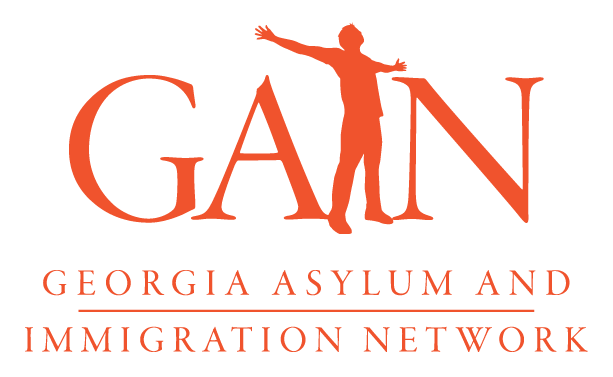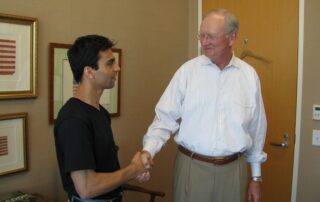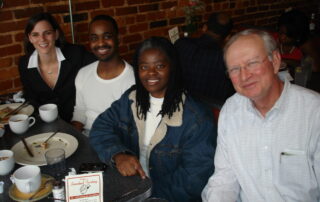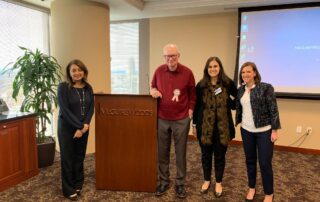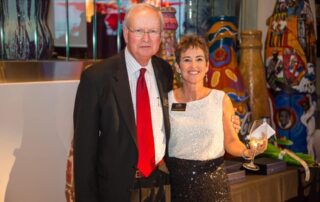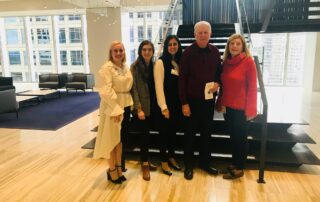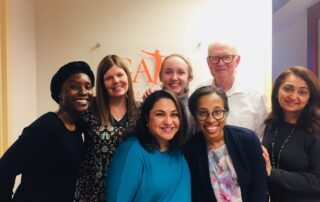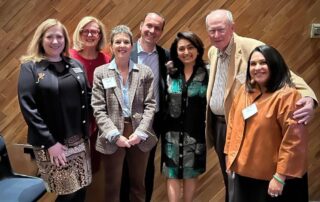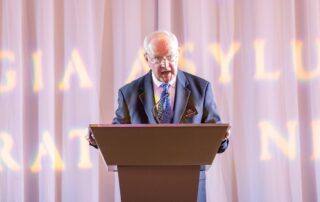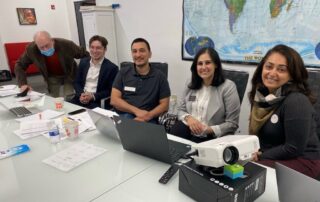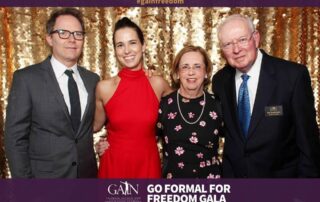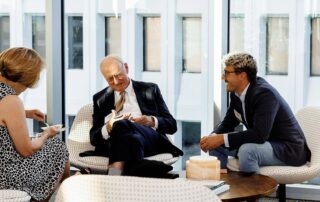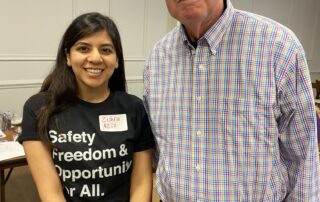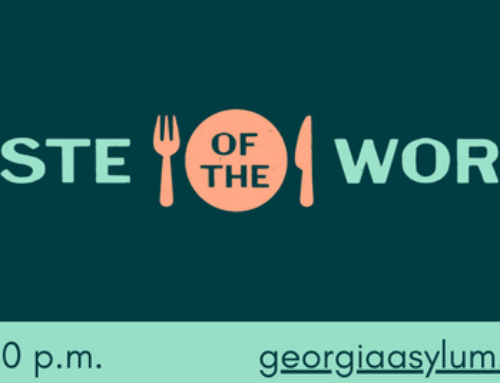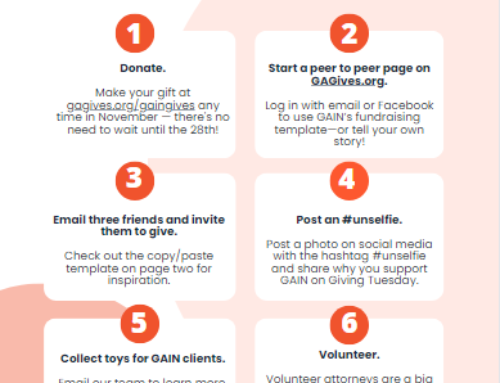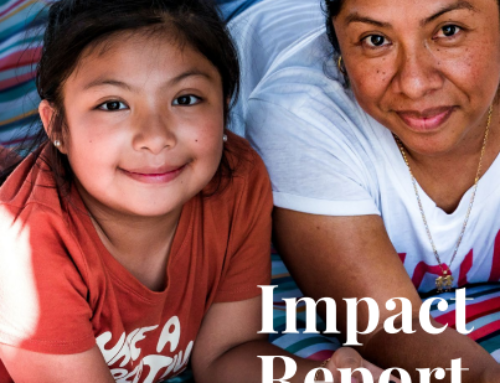In 2023, GAIN has celebrated many milestones. We are in our 18th year of service here in Georgia. We have built new partnerships and strengthened our ties to the community. But perhaps the moment we hold most dear is celebrating a big anniversary! Bill Hoffmann has been one of the brightest champions for GAIN in Georgia, and this year marks 10 years since he joined our staff as our volunteer Senior Counsel.
William E. Hoffmann, Jr. is a legal legend and a passionate advocate for asylum-seekers here in Georgia. Until his retirement in 2012, he served for five years as the pro bono partner at King & Spalding where, prior to being named pro bono partner, he was a litigation partner. Bill has received awards for his pro bono work from GAIN, Emory University, The College of William & Mary, The State Bar of Georgia and the Women’s Resource Center to End Domestic Violence. He is a frequent guest lecturer on human rights issues at Emory University, the College of William & Mary, Georgia State University, Georgia Institute of Technology and the College of Charleston. He serves on GAIN’s Advisory Board. This year, we mark ten years since Bill began to advise our staff as Senior Counsel — and even longer since he took his first GAIN case and started on the path to becoming the most dedicated volunteer we have ever known.
This week is also National Pro Bono Week, and it’s fitting that we celebrate and lift up Bill because of his pro bono advocacy and pro bono service over the years. Bill’s work is an incredible example of the power of this year’s theme, “Voices of Democracy: Ensuring Justice for All.” Throughout his career, he has been a guiding light, not only for GAIN but for multiple public interest legal organizations. Through his pro bono service, he ensures access to justice for our clients and makes us stronger every day.
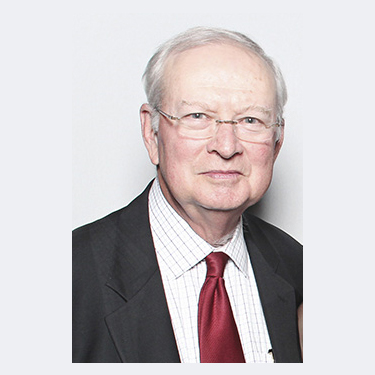
Recently, GAIN’s Director of Development, Kate McNeely, sat down with Bill to capture some of his thoughts and reflections on the anniversary.
Bill, you’ve been a leader in pro bono – since before you came to join us at GAIN – as the Pro Bono partner of King and Spalding. Tell me how would you say that your pro bono work has affected your life?
Bill: Well, I just can’t imagine life without it. It was the natural thing for me to do — I’ve always felt that people who are fortunate have an obligation to help others, and pro bono work has allowed me to fulfill that obligation.
You oversaw pro bono for a global firm. What stands out to you about pro bono in Georgia, and particularly about immigration pro bono?
Bill: What stands out to me is the quality and the dedication of the lawyers in this state who take on pro bono cases. And I think Georgia has been outstanding in the relationship between organizations like GAIN, the ACLU, Atlanta Legal Aid and others, and the private practicing lawyers in Atlanta. Those organizations do three things to further pro bono work in Georgia: they screen cases for the law firms, provide training, and they provide mentoring. The organizations hold the hands of the law firms throughout the cases and help them every step of the way.
And what about before you were a pro bono partner? What were some of the highlights of your career?
Bill: When I first started practicing law in Atlanta—the first month I was here—I told my supervising partner that I’d like to take a pro bono case, and he said, “Go find one!” I didn’t know what to do. I had heard of the ACLU, so I approached them and asked for a First Amendment case. They almost laughed me out of the office! As it turns out, First Amendment cases were very rare, but they offered me a death penalty case. I said, “No, I can’t do that,” and they said, “Yes you can. We will help you. We will train you. We’ll provide you with mentoring and we know that you can do it.”
Well, I took on a death penalty case for a young man who was on death row in Reidsville, GA. I filed habeas corpus in the state court. I went down to Reidsville, GA and had a hearing before the judge, who was friendly and as nice as he could be, and ruled against me on every point. I appealed it to the Georgia Supreme Court and argued before the Georgia Supreme Court and lost on every point. I filed a federal habeas corpus, which was in the District Court in Savannah. I had the opportunity to meet the judge through my uncle, and he was so kind and welcoming. (It’s important to understand that in a death penalty case, you always raise every possible issue you can. An issue that is not meritorious one day, might be meritorious two years later, for example, because of a subsequent Supreme Court decision.) So I had raised many points, and I started to argue my strongest point before this judge. He stopped me and selected the weakest point in my pleadings and made me argue that one. Ultimately, I lost the case before that judge, but then it was appealed to the Federal Court of Appeals for the 5th Circuit. There, we finally won the case, and the client’s sentence was commuted to a life sentence.
There’s another I want to tell you about, too. It turns out that going down to the ACLU and asking for a First Amendment case wasn’t a bad idea after all, because a few months later they called me and said, “We have a First Amendment case for you.” My clients were the student editors of a high school newspaper. They wrote an article that was critical of some of the work of a Senator from Georgia, and their principal didn’t think that was appropriate for a school paper. Well, there had recently been a Supreme Court case (Tinker vs. Des Moines, Iowa) that established that this kind of political journalism was within the First Amendment rights of high school newspapers. Based on that case, I sued the school board. We went before a federal judge on a summary judgement motion, and the judge called us back to his chambers. I thought, “Oh boy, I am going to lose this case.” But the judge looked at the merits and saw that our First Amendment case was valid. The school board settled the case; they reinstated the students and teachers to the paper, and allowed it to start up again. A few months later, I received a letter from the Hugh M. Hefner Foundation, informing me that my clients and I had been selected to win the Hugh M. Hefner First Amendment Award for Print Journalism that year. So three of the student editors and I flew out to Los Angeles to receive the award. And that award is still sitting proudly on my desk.
These stories are amazing. You have seen so much in your career. And in 10 years, you’ve seen an incredible transformation here at GAIN. We are ten times the size we were, and we’re working with more clients than ever before. What do you think has changed in this work and what is the same?
Bill: The volume has changed, the quality has not changed. If anything, it has gotten better with more people — more minds put to work on the cases. Teamwork not only increases the volume of the work, but also the quality, which was always first rate, but it’s even better now.
After 10 years, you’ve also been a mentor to at least seven GAIN staff attorneys, and countless interns, volunteers and community members. Tell us about a relationship that stands out to you.
Bill: Well, the one that stands out to me is Priscila [Barravecchia]. Priscila was a paralegal at GAIN, and at first I saw her as very soft spoken, but we struck up a few conversations and found that we had common interests. She had earned a Master’s degree in Latin American Studies from the University of Florida, and I was interested in her perspective from her studies. So we got to know each other and I introduced her to several organizations. The two that come to mind are the ACLU and the Atlanta Council on International Relations. She went to both of those organizations’ meetings with me several times. I particularly remember going to the meeting of the Atlanta Council on International Relations where the speaker was the ambassador from Brazil. And everyone at this meeting was, you know, old lawyers like me and Priscila was young. She stood up and asked the first question during the question and answer period of the Brazilian Council. And the ambassador, he said, “That is an excellent question.” And that thoughtfulness exemplifies Priscila.
I love that. I also want to ask about the time you dedicate to this work. I know you have a full life with your family, with a loving wife, kids, and grandkids. And you have shared that life with us. We all remember when you showed up to one of our virtual staff meetings in the early days of the pandemic with your family members, ready to sing original songs about our work. We are so grateful to be able to share that joy with you. So what motivates you to spend this time with GAIN? With our clients?
Bill: Just to be productive. I need to be productive and help others. I can’t abide by the idea that retirement means sitting around, watching TV, reading books, and playing golf. I want to be productive and I’m grateful to GAIN for giving me that opportunity.
And can you tell me about a GAIN client whose story has affected your own life?
Bill: I’m going to tell you stories about two clients that have touched me. One was a young man from Iran, a political activist. He was threatened, and had to flee the country to save his life. He flew to another country first and ultimately was able to get to Atlanta, but then he was placed in detention. His case was set for a hearing before an immigration judge, and we won the case. They gave me the date and time of his release, and I went to pick him up. He got in the car, this man who has been through so much, and as we drove, I saw him start to dream about his life outside of detention here. The next thing he said to me as we drove along was “Mr. Hoffmann, what would I need to do to start my own business in Atlanta?” This is the type of person that comes to the United States after having to flee his or her country.
The second person I want to tell you about is a young woman from Rwanda. She survived the Rwandan genocide and went on to go to graduate school in political science in the Netherlands. When she was in the Netherlands, she started writing a Master’s thesis critical of the way the new government was handling the trials of people who were involved in committing the genocide. They tried to stop her with harm, imprisonment, and threats, but she got her thesis published. And afterwards, she came to the United States and applied for asylum. The case dragged on and on, and she was having a hard time. One day we were speaking about her options and she was in tears. Believe it or not, my secretary came down on the elevator waving the decision. In her hand. “Your asylum has been granted!” So, I was able to put her in touch with organizations like the International Rescue Committee and others that helped her find housing. After that she started a business herself and went to work for an organization such as that. But the capstone is that she has founded her own, not-for-profit organization here in Atlanta that provides housing and food and services for women who have been victims of domestic violence.
That’s amazing. OK, I think we have everything. Is there anything else that you want to add before I turn off the recording?
Bill: Well, I would just like to add that I’ve given you a few stories of a few clients. There are many others. They are all very satisfying to me and I owe a great debt of gratitude to GAIN for giving me the opportunity to do this work. And as I get older, putting up with me and my lack of technology and still trying to work on these cases and so — to GAIN, thank you very much.
Bill, we owe you a debt of gratitude. Thank you.
